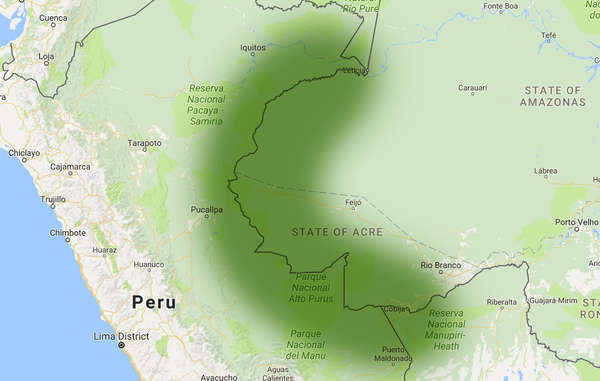
by Deep Green Resistance News Service | Dec 1, 2016 | Colonialism & Conquest
Featured image: The Amazon Uncontacted Frontier, a large area on the Peru-Brazil border that is home to the largest concentration of uncontacted tribes in the world. © Survival International
By Survival International
A new “death road” advocated by a notorious Italian priest is set to cut in two the land of several uncontacted tribes in the heartland of the Amazon Uncontacted Frontier.
The road is expected to be approved by Peru’s congress soon, and will run through 270 km of the Amazon’s most biodiverse and sensitive protected areas.
The project has been supported for years by Father Miguel Piovesan, a Catholic priest who has described the local tribal peoples as “prehistoric,” and slammed international NGOs for raising concerns about the plan.
The road was rejected by Peru’s Congress in 2012. Despite this, work continued illegally for many years, and now the project has been proposed again by Congressman Carlos Tubino.
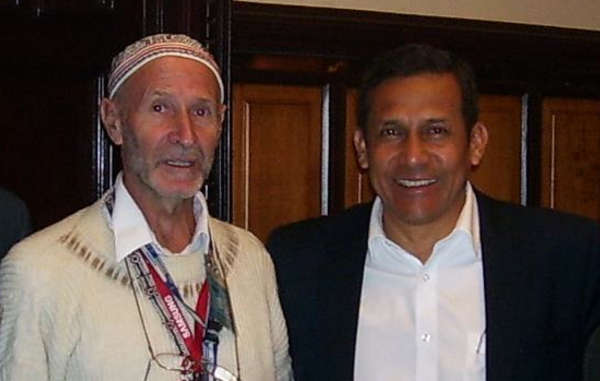
Fr. Miguel Piovesan, the main backer of the Purus road, alongside former President Ollanta Humala.
© Anon
Uncontacted tribes are the most vulnerable peoples on the planet. There are estimated to be around 15 uncontacted peoples in Peru, many of them in the region where the road will be built.
Survival International has lodged a complaint with the United Nations, citing the catastrophic impact on the uncontacted Indians and urging the Peruvian government to veto the plan.
Of the 3-4,000 people in the area, around 80% are indigenous. Most of them are opposed to the road.
Emilio Montes, president of the indigenous organization FECONAPU, which is based in Puerto Esperanza said: “We flatly reject this road. We indigenous people won’t benefit from it, only the loggers, miners, oil companies and narcotraffickers. It threatens the lives of our isolated relatives, like the Mashco Piro. It will destroy our animals and plants. They should, instead, respect our ancestral territories. We’ve always lived here, and our children must carry on doing so. We need another type of development which looks after our resources sustainably: so that we can live properly, and secure our future.”
Survival’s Director Stephen Corry said: “If this road goes ahead, it will destroy the uncontacted tribes, and their “development” will be terminated for ever. Survival has fought roads in this part of Amazonia for decades. Who are they supposed to help? If Peru has any respect for fundamental human rights and the rule of law, it must stop these plans now.”
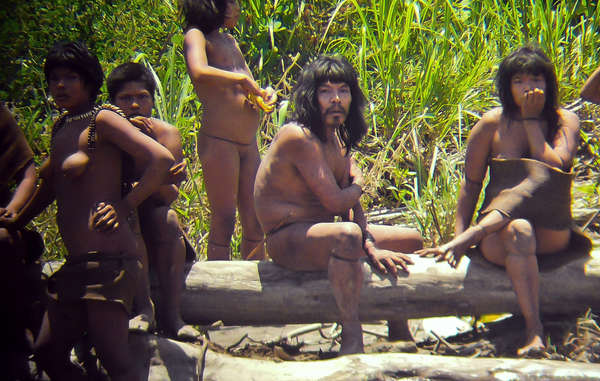
Uncontacted Mashco-Piro Indians on a riverbank near the Manú National Park. 2011.
© Jean-Paul Van Belle
Background
- The road will connect Puerto Esperanza to the Inter-Oceanic Highway, which runs through Peru and Brazil. The area is part of the Amazon Uncontacted Frontier, the region along the Peru-Brazil border with the highest concentration of uncontacted tribes in the world.
- Uncontacted peoples who could be wiped out if the road is built include the Mashco Piro, Chitonahua, Mastanahua and Sapanawa, who have all lived nomadically in the region for generations. Outsiders such as missionaries and loggers have forced several groups to make contact in recent years.
- Elsewhere in the Amazon, road “development” projects have allowed an influx of colonists to access remote areas and threaten the lives and lands of uncontacted peoples.
- Several indigenous organizations in Peru have made a statement rejecting the road.
- Fr. Piovesan has repeatedly denied the existence of uncontacted peoples. His parish newsletter stated that: “Isolation is not a natural wish. We can’t prove that isolated people exist. They are dreamt up by those who barely know indigenous people, or base their investigations on unproven theories.”
- Uncontacted Indians have clearly expressed their desire to remain uncontacted. The project cannot be carried out with their consent and will violate their right to determine their own futures.
We know very little about uncontacted tribes. But we do know there are more than a hundred around the world. And we know whole populations are being wiped out by genocidal violence from outsiders who steal their land and resources, and by diseases like flu and measles to which they have no resistance.
Uncontacted tribes are not backward and primitive relics of a remote past. They are our contemporaries and a vitally important part of humankind’s diversity. Where their rights are respected, they continue to thrive.
All uncontacted tribal peoples face catastrophe unless their land is protected. Survival International are doing everything we can to secure their land for them, and to give them the chance to determine their own futures.
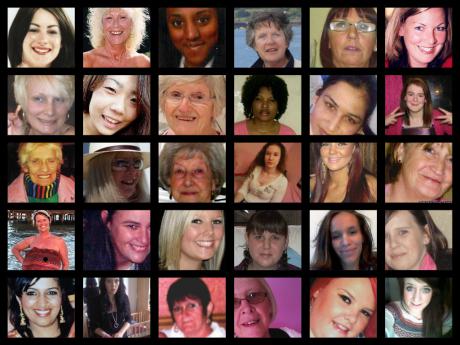
by Deep Green Resistance News Service | Nov 30, 2016 | Male Violence
Featured image: Counting Dead Women project
by Karen Ingala Smith / openDemocracy
Across everything that divides societies, we share in common that men’s violence against women is normalised, tolerated, justified – and hidden in plain sight.
Since 25 November last year, at least 118 women and girls in the UK aged over 13 have been killed by men, or a man has been the primary suspect.
An average of one woman dead at the hands of a man every 3 days.
I’ve been recording women’s names and details of how they were killed since January 2012 when Counting Dead Women was launched.
Today we commemorate 653 women.
Men’s fatal violence against women in the UK crosses boundaries of class, race, nationality and age. Over the last year, the oldest woman killed was 85, 18 were over 60, and 21 were aged 25 and under. They included hairdressers, writers, shop assistants, prostituted women, a politician, lawyers, students and school girls; women born in Eritrea, Poland, China, Italy and other countries, and of course women born in the UK with a range of ethnic backgrounds. Most, but not all, were killed by current or former partners, others were killed by burglars, rapists, neighbours, brothers, sons, men they saw as friends or men who paid for sex.
Many think of intimate partner violence, or, more broadly, domestic violence, if they think about women killed by men at all. This focus is reflected and reinforced by official statistics. The Office for National Statistics (ONS) publishes an annual report on violent crime, including homicide. For the year ending March 2015, the Home Office Homicide Index recorded 518 homicides. There were 186 female victims, 331 male victims, and one victim whose sex is unknown/undeclared.
The proportion of female victims was the highest recorded for 20 years. 19 men and 81 women were killed in circumstances described as partner/ex-partner homicides. 31 were killed by other family members (domestic/family violence).
But what about the remaining 74 women? Is it important to have a sex-specific analysis of their deaths?
51-year-old Majella Lynch died in hospital after the a removal of a 400ml shampoo bottle from her abdominal cavity. William Mousley QC, prosecuting, said “The bottle could not have been self-inserted because of the extreme pain such an act would have caused.” Mousley said her attacker, Daniel McBride, 43, an habitual user of hardcore pornography “had an interest in violent sexual activity and was in the mood for sex that night having had an argument with his girlfriend and being rejected by another female.” Yvette Hallsworth, 36, was selected by Mateusz Kosecki because she was “slightly built.” At 18 he was already a predator targeting women in prostitution. He had attacked at least three women who sold sex before he killed Yvette Hallsworth, stabbing her 18 times. Judge Michael Stokes QC described him has having a “fascination, if not an obsession” with prostituted women.
How can a feminist perspective of men’s violence against women disregard some women when patriarchal misogyny, violent sexualisation and objectification are so clear in their murders?
The prevalence of intimate partner violence (IPV) is globally uneven. Corradi and Stockl, 2014, looked at the relationship between men’s fatal violence against women, feminist activism and government policy in European countries since the 1970s. They found no clear link between rates of IPV and government policies, rather that feminist activism was a crucial catalyst of change – and was most effective when it was independent of government.
“Since the late 1960s, organized women’s activism played a fundamental role in rallying the state to tackle VAW.” (Corradi & Stockl, 2014: 605).
It is estimated that across the world around 66,000 women and girls are violently killed every year. Comparing country-by-country data is challenging, partly because there isn’t a cross-national approach to collecting and disaggregating murder statistics by the sex of both victim and killer, but globally women are at greater risk than men of intimate-partner homicides and are overwhelmingly killed by males. Across everything that divides societies, we share in common that men’s violence against women is normalised, tolerated, justified – and hidden in plain sight, and that there is a lack of truly proactive and deeply rooted state action to protect women’s right to life.
Of course it is essential to look at domestic and intimate partner violence, including homicide; but to focus only on this context not only obscures the full extent of men’s fatal violence against women, it also misses the sex differences within these crimes. In the UK, women are more than 7 times more likely to be killed by a man than men are by a women in the context of intimate partner homicide. Men are more likely than women to be killed by a same-sex partner, and histories of violence before the homicide are different – with men tending to have inflicted months or years of violence and abuse on the women they go on to kill, while women tend to have suffered months or years of violence and abuse from the man they go on to kill.
Responses to men’s violence against women which focus almost exclusively on “healthy relationships,” supporting victim-survivors and reforming the criminal justice system simply do not go far enough. Men’s violence against women is a cause and consequence of sex inequality between women and men. The objectification of women, the sex trade, socially constructed gender, unequal pay, unequal distribution of caring responsibility are all simultaneously symptomatic of structural inequality whilst maintaining a conducive context for men’s violence against women. Feminists know this and have been telling us for decades.
One of feminism’s important achievements is getting men’s violence against women into the mainstream and onto policy agendas. One of the threats to these achievements is that those with power take the concepts, and under the auspices of dealing with the problem shake some of the most basic elements of feminist understanding right out of them. State initiatives which are not nested within policies on equality between women and men will fail to reduce men’s violence against women. Failing to even name the agent – men’s use of violence – is failure at the first hurdle.
Working in partnership, Counting Dead Women and Women’s Aid Federation England, supported by Freshfields Bruckhaus Deringer and Deloitte, have developed The Femicide Census, a relativity database that allows data to be collated and disaggregated for analysis. It currently contains information regarding over 1000 women who were killed by men between 2009 and 2015. Our intention is to build a research resource than can be used as a tool to influence understanding and policy development. We’ll soon be releasing our first report. In September, our work was cited as an example of good practice in a report by the UN Special Rapporteur on violence against women.
Feminists have started Counting Dead Women or femicide count projects in Australia, Canada, New Zealand and Counting Dead Aboriginal Women. There is feminist action against femicide on every continent, in countries including Argentina, Peru, Italy, Spain, India.
Women across the world are finding ways to protest the murders of our sisters.
By recording women’s names, and where possible their photographs, we want to create a reminder that women are not reducible to statistics.
653 women dead in the UK in 5 years at the hands of men cannot be 653 isolated incidents. Action is needed and action can be taken to reduce these killings.
Read more articles on openDemocracy in this year’s 16 Days: Activism Against Gender-Based Violence. Commissioning Editor: Liz Kelly

by Deep Green Resistance News Service | Nov 29, 2016 | Rape Culture, Repression at Home
by Robert Jensen
From a “critique” of my work on the latest Professor Watchlist, I learned that I’m a threat to my students for contending that we won’t end men’s violence against women “if we do not address the toxic notions about masculinity in patriarchy … rooted in control, conquest, aggression.”
That quote is the “evidence” that I am one of those college professors “who discriminate against conservative students, promote anti-American values, and advance leftist propaganda in the classroom,” according to the watchlist’s mission statement.
This rather thin accusation appears to flow from my published work instead of an evaluation of my teaching, which confuses a teacher’s role in public with the classroom. So, I’ll help out the watchlist and describe how I address these issues at the University of Texas at Austin, where I’m finishing my 25th year of teaching. Readers can judge the threat level for themselves.
I just completed a unit on the feminist critique of the contemporary pornography industry in my course “Freedom: Philosophy, History, Law.” We began the semester with On Liberty by John Stuart Mill (I’ll assume the Professor Watchlist approves of that classic book), examining how various philosophers have conceptualized freedom. We then studied how the term has been defined and deployed politically throughout U.S. history, ending with questions about how living in a society saturated with sexually explicit material affects our understanding of freedom. I provided context about feminist intellectual and political projects of the past half-century, including the feminist critique of men’s violence and of mass media’s role in the sexual abuse and exploitation of women in a society based on institutionalized male dominance (that is, patriarchy).
The revelations about Donald Trump’s sexual behavior during the campaign provided a “teachable moment” that I didn’t think should be ignored. I began that particular lecture, a week after the election, by emphasizing that my job was not to tell students how to act in the world but to help them understand the world in which they make choices.
Toward that goal, I pointed out that we have a president-elect who has bragged about being sexually aggressive and treating women like sexual objects, and that several women have testified about behavior that—depending on one’s evaluation of the evidence—could constitute sexual assault. Does is seem fair, I asked the class, to describe him as a sexual predator? No one disagreed.
Trump sometimes responded by contending that Bill Clinton was even worse. Citing someone else’s bad behavior to avoid accountability is a weak defense (most people learn that as children), and of course Trump wasn’t running against Bill, but we can learn from examining the claim.
As president, Bill Clinton abused his authority by having sex with a younger woman who was first an intern and then a junior employee. He settled a sexual harassment lawsuit out of court, and he has been accused of rape. Does it seem fair to describe Bill Clinton as a sexual predator? No one disagreed.
So, we live in a world in which a former president, a Democrat, has been a sexual predator, yet he continues to be treated as a respected statesman and philanthropist. Our next president, a Republican, was elected with the nearly universal understanding that he has been a sexual predator. How can we make sense of this? A feminist critique of toxic conceptions of masculinity and men’s sexual exploitation of women in patriarchy seems like a good place to start.
In that class, I spent considerable time reminding students that I didn’t expect them all to come to the same conclusions but that they all should consider relevant arguments in forming judgments. I repeated often my favorite phrase in teaching: “Reasonable people can disagree.” Student reactions to this unit of the class varied, but no one suggested that the feminist critique offered nothing of value in understanding our society.
Is presenting a feminist framework to analyze a violent and pornographic culture politicizing the classroom, as the watchlist implies? If that’s the case, then the decision not to present a feminist framework also politicizes the classroom, in a different direction. The question isn’t whether professors will make such choices—that’s inevitable, given the nature of university teaching—but how we defend our intellectual work (with evidence and reasoned argument, I hope) and how we present the material to students (encouraging critical reflection).
If the folks who compiled the watchlist had presented any evidence that I was teaching irresponsibly, I would take the challenge seriously. At least in my case, the watchlist didn’t. But rather than assign a failing grade, I’ll be charitable and give the project an incomplete, with an opportunity to turn in better work in the future.
Robert Jensen is a professor in the School of Journalism at the University of Texas at Austin, and author of The End of Patriarchy: Radical Feminism for Men, to be published in January by Spinifex Press. Other articles are online at http://robertwjensen.org/. He can be reached at rjensen@austin.utexas.edu.
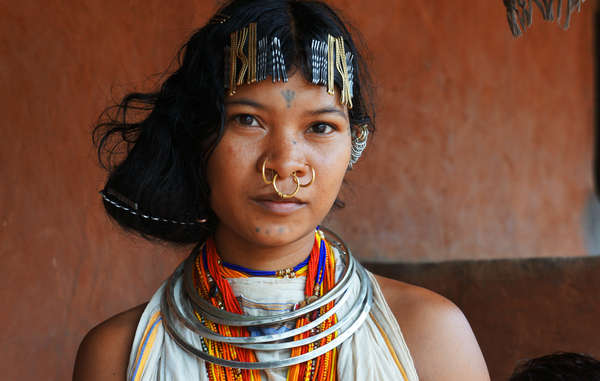
by Deep Green Resistance News Service | Nov 25, 2016 | Indigenous Autonomy, Mining & Drilling
by Survival International
A mining company in India has renewed its efforts to start mining on the sacred hills of the Dongria Kondh people, despite previous defeat in the Supreme Court, and determined opposition by the tribe.
The Dongria Kondh consider the Niyamgiri Hills to be sacred and have been dependent on and managed them for millennia. Despite this the Odisha Mining Corporation (OMC), which previously partnered with British-owned Vedanta Resources, is once again attempting to open a bauxite mine there.
In February this year, OMC sought permission from India’s Supreme court to re-run a ground breaking referendum, in which the Dongria tribe had resolutely rejected large-scale mining in their hills. This petition was thrown out by the Supreme Court in May.
India’s Business Standard reported recently that OMC is gearing up for yet another attempt to mine, after getting the go-ahead from the government of Odisha state.
Dongria leader Lodu Sikaka has said: ”We would rather sacrifice our lives for Mother Earth, we shall not let her down. Let the government, businessmen, and the company argue and repress us as much as they can, we are not going to leave Niyamgiri, our Mother Earth. Niyamgiri, Niyam Raja, is our god, our Mother Earth. We are her children.”
For tribal peoples like the Dongria, land is life. It fulfills all their material and spiritual needs. Land provides food, housing and clothing. It’s also the foundation of tribal peoples’ identity and sense of belonging.
The theft of tribal land destroys self-sufficient peoples and their diverse ways of life. It causes disease, destitution and suicide.
The Dongria’s rejection of mining at 12 village meetings in 2013, led the Indian government to refuse the necessary clearances to mining giant Vedanta Resources. This was viewed as a heroic David and Goliath victory over London-listed Vedanta and the state-run OMC.
Only the Dongria’s courageous defence of their sacred hills has stopped a mine which would have devastated the area: more evidence that tribal peoples are better at looking after their environment than anyone else. They are the best conservationists and guardians of the natural world. Protecting their territory is an effective barrier against deforestation and other forms of environmental degradation.
by Deep Green Resistance News Service | Nov 22, 2016 | Strategy & Analysis
Trump’s election has sabotaged any prospect of reigning in the global warming crisis
by Max Wilbert / Deep Green Resistance
On Tuesday night, the American people decided to elect Donald J. Trump, a billionaire business mogul and reality TV star who has been accused of raping or otherwise sexually assaulting twenty-three women, who has called for banning immigration to the United States, and who has built a campaign on virulent racism.
He received more than 60 million votes.
There is a lot to process. Those conversations, about the growing tide of white supremacy, about Trump’s pending sexual assault cases, about the fact that Hillary Clinton won the popular vote, about the left’s failure to engage with the white community on issues of race, and about the gerrymandering and voter disenfranchisement that characterizes the American system, are already taking place.
I want to focus here on one specific issue: global warming. As I’m writing this, I’m sitting in the sun outside my home. It’s November, and temperatures are more than 20 degrees above the typical average here. This year, 2016, is predicted to be the hottest year on record, beating out last year, which beat out the previous year, which beat out the previous year, each of the last five setting a new mark.
Records are being smashed aside like bowling pins. We are in the midst of a global catastrophe, and it is even worse than previously thought. On the day after the election, news broke that the climate is more sensitive to global warming than most calculations had suspected.
The study in question predicted nearly double the warming that the Intergovernmental Panel on Climate Change (IPCC) had previously expected. The new data predicts between 9 and 14 °F warming by 2100, enough to potentially lead to the extinction of the human species and flip the Earth into a completely new regime more similar to Venus than Earth. Michael Mann, one of the most well-known climate scientists in the world, says these findings and the changing political situation may mean “game over for the climate.”
Into this mess strides Donald Trump, who has said that if elected, he would “immediately approve” the Keystone XL pipeline, roll back environmental regulations, further subsidize the fossil fuel industry, and back out of the Paris climate agreement. Coal and oil stocks, as well as shares of equipment companies and railroads, jumped in price after news of his victory hit.
 Right now, thousands of native people and allies are gathering on the cold plains of North Dakota in an attempt to stop the Dakota Access Pipeline. Under President Obama, such popular movements had a chance—a small chance, but a chance—of success. Under Trump, there won’t be so much leniency, and the road to victory will be much harder.
Right now, thousands of native people and allies are gathering on the cold plains of North Dakota in an attempt to stop the Dakota Access Pipeline. Under President Obama, such popular movements had a chance—a small chance, but a chance—of success. Under Trump, there won’t be so much leniency, and the road to victory will be much harder.
History is clear; social movements have generally flourished under slightly more progressive administrations, and waned under right wing leadership. What does this mean for our strategy?
I would like to have a peaceful transition to a sane and sustainable world, but it seems increasingly impossible. The American people have shown themselves to be a reactionary force, clinging to their privilege as if it can shield them against the arrows that originate in American foreign policy. Immigrants come here because their lands have been destroyed for American capitalism, and groups like ISIS have emerged from a slurry of war, oil, racism, and fundamentalism.
Perhaps, then, we need a different type of change. When it comes to protecting the planet, stopping pipelines needs to be one of our first priorities. And like other Earth-destroying machinery, pipelines are very vulnerable. They stretch on for miles with no guards, no fences, and no protection.
Recently, a number of activists, including some who I know, were able to approach and shut down all five pipelines that carry tar sands oil into the United States in a coordinated act of non-violent civil disobedience. Their action was brave, but its long-term efficacy depends on whether courts will agree with them that their action was necessary and create a precedent to normalize actions of this type. With another Antonin Scalia on the way to the Supreme Court, a positive outcome is in doubt.
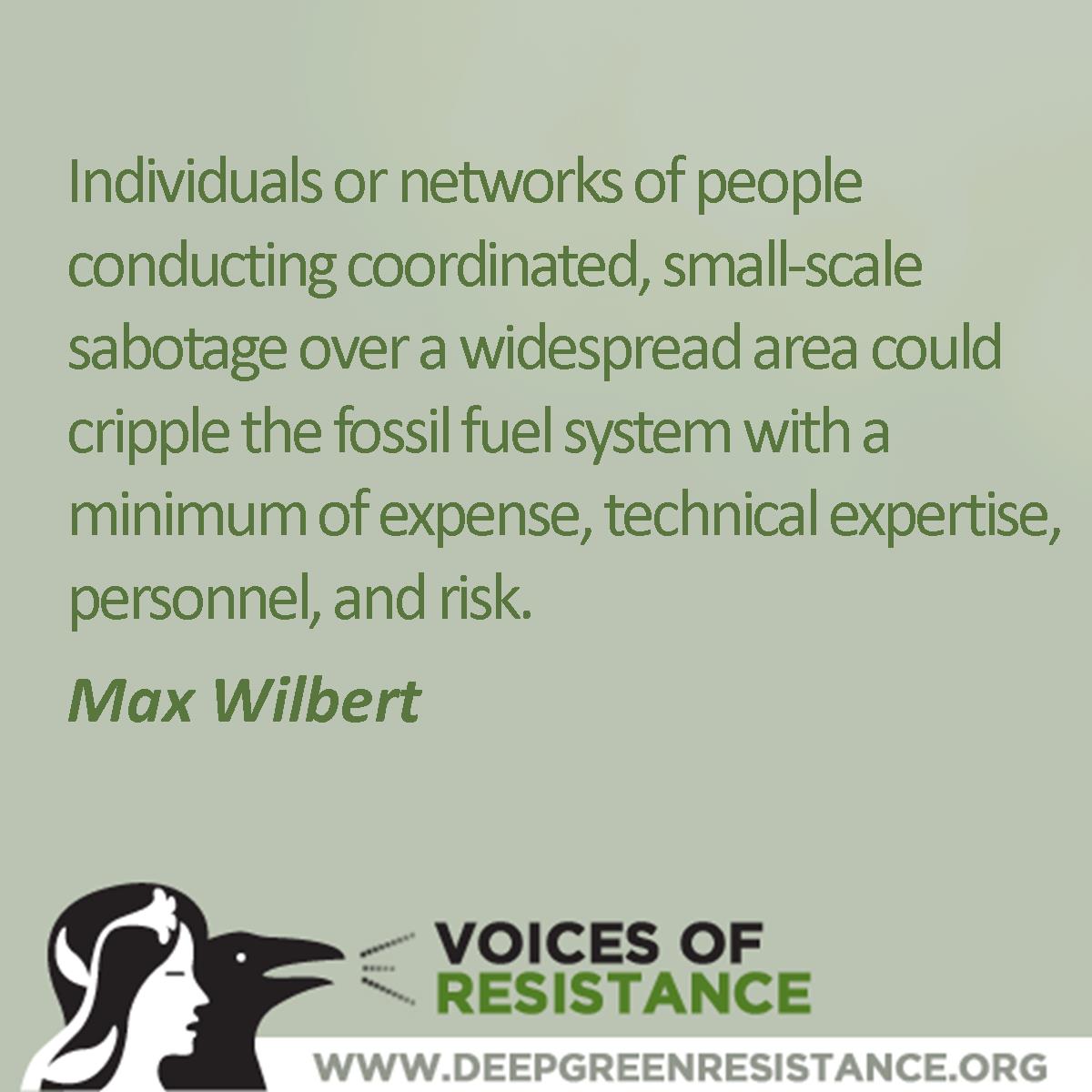 Coordinated action of another type could be more effective in protecting the planet. In plain language, I speak of sabotage. Individuals or networks of people conducting coordinated, small-scale sabotage over a widespread area could cripple the fossil fuel system with a minimum of expense, technical expertise, personnel, and risk. It is simple to disappear into the night, and with proper security culture the possibility of capture is remote. We’ve seen how vulnerable this network is; anyone could do this.
Coordinated action of another type could be more effective in protecting the planet. In plain language, I speak of sabotage. Individuals or networks of people conducting coordinated, small-scale sabotage over a widespread area could cripple the fossil fuel system with a minimum of expense, technical expertise, personnel, and risk. It is simple to disappear into the night, and with proper security culture the possibility of capture is remote. We’ve seen how vulnerable this network is; anyone could do this.
It isn’t idle speculation that such attacks would have a substantial impact. Its actually been done before, most notably in Nigeria, where indigenous people in the Niger River Delta have risen against polluting oil companies many times over the past several decades. Most recently, attacks on oil pipelines earlier this year shut down some 40 percent of Nigeria’s oil processing. Months later, the oil industry still hasn’t recovered.
To many people, this plan will sound insane. Modern life is dependent upon oil in so many ways. But when oil is killing the planet and those in power will not respond to rational argumentation or peaceful protest, and when sixty million people are willing to vote a climate-denying sexual abuser into office, what options are we left with? It is time for serious escalation.
Max Wilbert is a writer, activist, and organizer with the group Deep Green Resistance. He lives on occupied Kalapuya Territory in Oregon.
To repost this or other DGR original writings, please contact newsservice@deepgreenresistance.org








 Coordinated action of another type could be more effective in protecting the planet. In plain language, I speak of sabotage. Individuals or networks of people conducting coordinated, small-scale sabotage over a widespread area could cripple the fossil fuel system with a minimum of expense, technical expertise, personnel, and risk. It is simple to disappear into the night, and with
Coordinated action of another type could be more effective in protecting the planet. In plain language, I speak of sabotage. Individuals or networks of people conducting coordinated, small-scale sabotage over a widespread area could cripple the fossil fuel system with a minimum of expense, technical expertise, personnel, and risk. It is simple to disappear into the night, and with